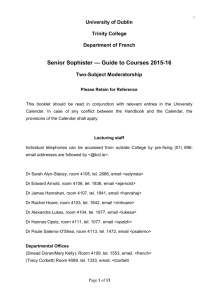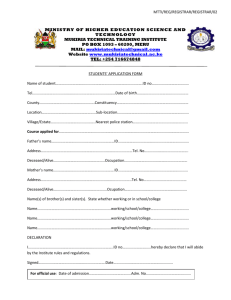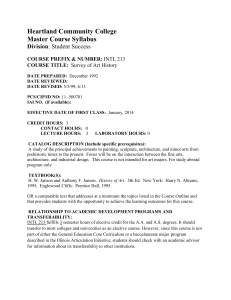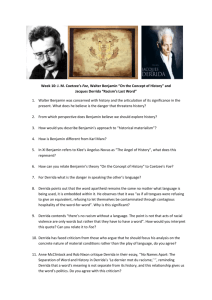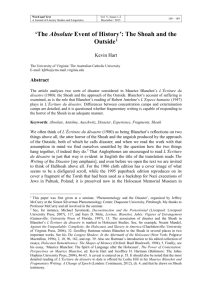Lecturing staff - Trinity College Dublin
advertisement
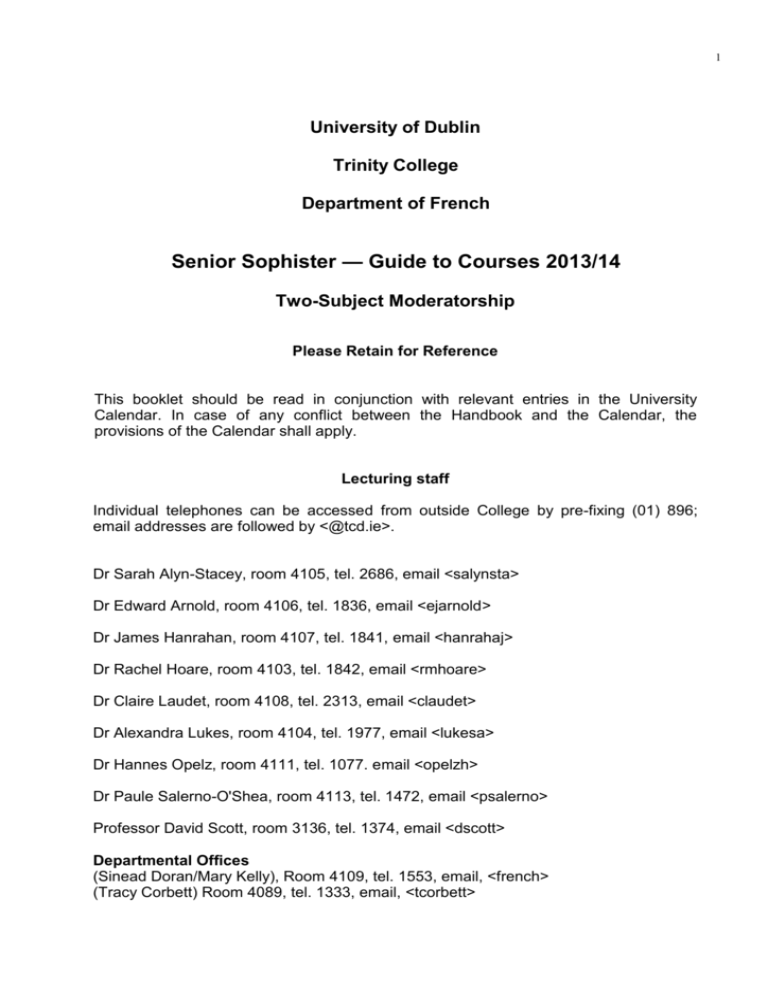
1 University of Dublin Trinity College Department of French Senior Sophister — Guide to Courses 2013/14 Two-Subject Moderatorship Please Retain for Reference This booklet should be read in conjunction with relevant entries in the University Calendar. In case of any conflict between the Handbook and the Calendar, the provisions of the Calendar shall apply. Lecturing staff Individual telephones can be accessed from outside College by pre-fixing (01) 896; email addresses are followed by <@tcd.ie>. Dr Sarah Alyn-Stacey, room 4105, tel. 2686, email <salynsta> Dr Edward Arnold, room 4106, tel. 1836, email <ejarnold> Dr James Hanrahan, room 4107, tel. 1841, email <hanrahaj> Dr Rachel Hoare, room 4103, tel. 1842, email <rmhoare> Dr Claire Laudet, room 4108, tel. 2313, email <claudet> Dr Alexandra Lukes, room 4104, tel. 1977, email <lukesa> Dr Hannes Opelz, room 4111, tel. 1077. email <opelzh> Dr Paule Salerno-O'Shea, room 4113, tel. 1472, email <psalerno> Professor David Scott, room 3136, tel. 1374, email <dscott> Departmental Offices (Sinead Doran/Mary Kelly), Room 4109, tel. 1553, email, <french> (Tracy Corbett) Room 4089, tel. 1333, email, <tcorbett> 2 Please read carefully the regulations and course-descriptions which follow, and complete this form in the following manner. 1. Name four Topics in order of preference. 2. Obtain the signature of a member of staff for your choice of special subject. 3. Return this page to the Departmental Office, Room 4111, by 12.00 hrs on Monday 18 February 2013 N.B. As far as possible the French Department will try and accommodate students in the courses of their choice, however, the department is not in a position to guarantee that all courses offered will take place. The number of students opting for a particular course, timetable constraints and availability of staff has to be taken into account. Students intending to go 'off books' in 2013/14 should still complete the form, but indicate their intention below. They should note that completion of this form does not in itself constitute a request for permission, which should be sought from the Senior Lecturer via their tutor at as early a stage as possible. Students who obtain permission, and then change their mind, should notify the department immediately. Name: (in block capitals): Student Number: _______ SS Topics: (state 1st, 2nd, 3rd and 4th choices in order of preference): 1. 2. 3. 4. Special Subject Dissertation: Subject area: Signature of intended supervisor: Year Off-Books: I intend/do not intend to spend next year off books. (Delete as applicable.) I confirm that I have received a copy of the departmental statement concerning courses and assessment for the Senior Sophister year 2013/14 Signature _____________________________ Date: _______________________ 3 Senior Sophister Requirements and Assessment Procedures The requirements for Senior Sophister students in TSM French in 2013/14 are as follows: 1. Language: All students are required to attend language classes, and submit regular written work. 2. Topics: Students select two Topics from the range offered. All choices are subject to availability, to timetable constraints and to the approval of the Head of Department. An assessment essay (2,500 words) is to be submitted in respect of each topic. One of the two assessment essays is to be written in French. The first essay is to be submitted by 12.00 hrs on Monday 13 January 2014, the second by 12.00 hrs on Friday 21 March 2014 to the Departmental Office, Room 4109. Titles for essays will be published in the SS Handbook which will be available on the French Department website http://www.tcd.ie/French/ at the beginning of the academic year. For details of courses, see list below. 3. Special Subject: Each student selects a special subject of his or her own choice, in consultation with an appropriate member of staff (for details of staff interests, see below). Please note that members of staff are instructed not to accept more than their quota of supervisees, and the fact that a student wishes to be supervised by a member of staff does not guarantee that the member of staff will be able or willing to act. It would obviously be prudent to consult with the supervisor of your choice at an early stage. The candidate's work on this special subject is to be embodied in a dissertation of 9,000 to 12,000 words, to be written in English or French, or in an alternative piece of submitted work of a different nature but of comparable substance, to be submitted in either case by 12.00 hrs on Monday 3 March 2014 to Room 4109. A computer-generated word-count must be included on the title page of your submitted dissertation. Please note that, if you exceed the set word-limit, your dissertation will be returned with an instruction to reduce the length appropriately. It is the student’s responsibility to ensure (s)he maintains adequate contact with her/his supervisor, who will provide guidance on how to improve content. The assessment for Moderatorship Part II for 2013 is as follows: 1. Language paper I (Translation into French and résumé) 2. Language paper II (Translation from French and essay) 3. Topic I (submitted work and examination) 4. Topic II (submitted work and examination) 5. Special subject (dissertation) or equivalent to be submitted in English or French 6. Viva voce examination The oral examination takes place in the presence of an extern examiner. As part of this examination, candidates will be required to deliver an oral exposé on one of two subjects chosen by the candidate, and approved in advance. The examination is followed immediately by discussion of the candidate’s dissertation, which may result in a modification of the provisional mark given. Candidates should note that, following comments from extern examiners concerning an unduly narrow focus of study in some instances, all ‘Topic’ papers will carry the rubric that candidates should avoid excessive overlap with dissertation subjects. More detailed information relating to exam requirements and marking will be published in the Senior Sophister Handbook which will be posted, in due course, on the Department Website. 4 Senior Sophister Courses 2013/14 NB Where a course is undersubscribed, the course may not be offered. 1. Memory, Myth, History: Writing Court and Conflict in 16th and 17th – Century France FR4038 (Dr Alyn Stacey) ______________________________________________________________________ Aims: The aim of this course is to provide students with an insight into the importance of the Court in 16th and 17th-century France and the extent to which it was often at the centre of social conflict. It aims also to look at some of the key socio-philosophical and literary changes which made themselves felt at every level of society during the 16 th and 17th centuries. Through close textual analysis of some of the major writings of the period and a variety of genres (film, drama, tragedy, comedy, propaganda, satire, poetry, narrative), the course aims to examine the representation of the Court, the writings of major Court writers and notions of ideal kingship. The course will also analyse modern cinematic representations of the court. Underpinning the course are the following questions: -What are the challenges posed when interpreting and representing the past? -What is the place of memory and/or myth in the writing of history/experience? -How does each genre confront these questions in the specific context of 16th-and 17th-century court literature? Objectives: By the end of the course, students will be acquainted with the works of some of the major writers of the 16th and 17th centuries. They will be familiar with a considerable range of ideas and genres which reflect the preoccupations of the time. They will be familiar with the aims of ‘heritage’ cinema. They will have developed their abilities to closely analyse texts and film. They will have discussed and become aware of the problematic of interpreting and writing the past. Course Structure: Teaching will be by lecture, student papers and discussion. Students are also encouraged to attend the seminars organised by the Centre for Medieval and Renaissance Studies based in Trinity (details from Sarah Alyn Stacey, Director of the Centre). The course is structured as follows: Michaelmas Term Introduction Filming the Renaissance Court La Reine Margot (Patrice Chéreau, 1994) French Court versus Papal Court Joachim Du Bellay, Les Regrets (Larousse) Ideal Kingship François Rabelais, Gargantua (Garnier Flammarion) Cleopatra in the Renaissance Etienne Jodelle, Cléopâtre captive (edition provided) Hilary Term Kings, Politics and Honour Pierre Corneille, Cinna (Paris, Garnier Flammarion) Passions and the Court Racine, Phèdre (Paris, Bordas) 5 Bienséance and the Court Molière, Le Bourgeois gentilhomme The Spiritual versus the Earthly Order Blaise Pascal, Trois discours des grands (Departmental edition to be provided) Filming the 17th-Century Court Tous les matins du monde (Alain Corneau, 1992) 2. Counter-Revolution Extreme Right(s) and Fascism in French Culture and Politics 1870-1945 FR4037 (Dr. Arnold) ____________________________________________________________________ The objectives of this course are to give students an insight into one of the main varieties of European fascism and a grounding in the intellectual, political, social and historical background of France during the Third Republic. This approach will focus upon literary, political and cultural manifestations of French fascism and extreme rightwing thought which originated in the intellectual climate of the Belle Epoque and its "fin-de-siècle” mood, were developed during the interwar years and were forcibly expressed during the Occupation years. The interest of studying the precursors of French fascism resides in the fact that many of the themes developed in France in the Belle Epoque fed the ideology of Italian fascism and Nazism. This has led many scholars to consider France as being the country which "invented" fascism. To this effect, the first part of the course will evaluate the importance of the intellectual and historical precursors of French counter-revolutionary thought and fascism. This will include the study of the individuals (Drumont, Barrès, Maurras) and movements (Action Française, Ligue de la Patrie Française, Ligue des Patriotes) involved in events such as Boulangism and the Dreyfus Affair, and the concomitant antisemitism, racialism and nationalism. The writings of Communist, Marxist and Marxist revisionist theorists (Guesde, Jaurès, Blum) will also be briefly studied to give a contextual perspective to these emerging anti-enlightenment themes. The second part of the course will investigate the influence of the Great War on the emergence of fascist doctrines, intellectuals and movements. A clear distinction can be made between literary, intellectual fascism (Drieu la Rochelle, Brasillach, Céline, Rebatet) and fascist or conservative-reactionary movements (le Faisceau, les Croix de Feu, le PSF, les Jeunesses Patriotes, le Francisme, la Cagoule, le PPF). The period of the Occupation and Vichy France -the third section of the course- is considered by some scholars to be the culminating point of the fascist temptation in France. Others see it as a return to conservative, reactionary values of pre-revolutionary France and not necessarily as a pure expression of French fascism. The final section of the course will analyse the ideology and political myths of the Front National in France, and ask the question whether the movement of notably Jean-Marie le Pen has reactivated some aspects of this ideological tradition in France. This course will be based on the study of primary sources of a varying nature (novels, autobiographies, political and economic programmes, visual and spoken propaganda, newspaper articles). 6 3. Language and society in the French-speaking world: status, diversity and function. FR4043 (Dr Hoare) _____________________________________________________________ This course comprises a sociolinguistic exploration of the French language, and its varieties throughout La Francophonie. The focus is on the relationship between language and society, covering such topics as language variation and innovation, bilingualism, diglossia, ethnolinguistics and code-switching, with specific reference to the French language. The Topic will comprise two main parts: Part one The position of French in the world. We will examine the diversity of the French-speaking world and the function of French in specific countries and regions: Is French a ‘world language’? French as a first language in Europe and North America o Case studies: language related rivalries o Switzerland, Belgium, Canada o Multilingualism and language policy French as a second language: the colonial heritage in Africa and the Dom Tom territories. o Multilingualism and language policy o Linguistic and non-linguistic factors o Student case studies Part two Exploring linguistic variation in Francophonie In part two, the focus will shift to individual language features, and the local varieties of French outside of France will be examined. Europe: Belgium and Suisse romande: pronunciation, grammar and vocabulary The French language in Canada Regional French in Africa French and Creole Teaching will be by lecture, seminar and student presentation. The material studied will come from a variety of sources, including linguistic journals (these will be made available to students on Blackboard), audio materials and electronic sources. In addition, students should consult the materials on the website of La délégation générale à la langue française et aux langues de France. http://www.dglf.culture.gouv.fr/ Recommended reading: Ager, D. (1995) Francophonie in the 1990’s: Problems and opportunities, Cambridge: Cambridge University Press. Ager D. (1990) Sociolinguistics and Contemporary French, Cambridge: Cambridge University Press Ball, R. The French-speaking World: A practical introduction to sociolinguistic issues. London: Routledge. Kline, M. and Mellerski, N. (2004) Issues in the French-Speaking World. CT: Greenwood Press. 7 Sanders, C. (ed.) (1993) French Today: Language in its social context, Cambridge: Cambridge University Press. 4. Writing and Deconstruction FR4040 (Dr Opelz) _____________________________________________________________ Ever since Plato sought to divorce writing from speech and thus relegate the former to little more than a defective, if not an altogether unreliable form of the latter, the question of writing lay dormant, century after century, as Western philosophy unfolded and spread its sway. Heedless of its own potentially problematic status as a mode of written discourse, philosophy set course for the great questions that captivated and troubled humankind. Although the problems posed by writing – what is the relationship between writing and language? between writing and thought? between the written word and the spoken word? between philosophy and other discursive forms (for example, literature)? – were never simply ignored by philosophers, it was not until French thinker Jacques Derrida (1930-2004) began to investigate them in the second half of the twentieth century that writing, as a serious philosophical inquiry, took centre stage. More precisely, with Derrida, the scene of writing, as it is played and replayed in the work of a number of exemplary writers and thinkers across the centuries, does not only become a decisive question for philosophy but exposes also that which displaces philosophical discourse itself. Through this displacement, Derrida argues, all our inherited assumptions are thrown into question, including those on which thought, writing, language occur at all. The purpose of this course will be to explore the process, practice, or event – known today the world over as ‘deconstruction’ – through which these assumptions are radically called into question. Four key French figures will guide us through the pressing issues that Derrida’s writings compel us to confront: Jean-Jacques Rousseau (17121788), Stéphane Mallarmé (1842-1898), Antonin Artaud (1896-1948), and Maurice Blanchot (1907-2003). The focus of this course will be twofold: first, we shall examine a select number of texts by the four authors under discussion and see how these texts raise theoretical questions about writing; second, we shall look at the way Derrida problematizes these questions by focusing on some of his best-known and ground-breaking essays. As such, the course will offer students an opportunity to address the issues at stake from a variety of perspectives (philosophy, poetry, drama, literary criticism) and is designed to assist them in expanding both their analytical skills and their conceptual language. This course will be especially useful for those with an interest not just in literary theory but also, more generally, in the age-old conversation between literature and philosophy. Course texts: Rousseau Jean-Jacques Rousseau, Essai sur l’origine des langues (1781) (Paris: Flammarion (coll. GF), 1993). Jacques Derrida, selection from De la grammatologie (Paris: Minuit (coll. Critique), 1967). 8 Mallarmé Stéphane Mallarmé, selection from Igitur, Divagations, Un coup de dés (Paris: Gallimard (coll. Poésie), 2003). Jacques Derrida, ‘La Double séance’ (1970), in La Dissémination (Paris: Le Seuil (coll. Points Essais), 1972). Artaud Antonin Artaud, Le Théâtre et son double (1938) (Paris: Gallimard (coll. Folio Essais), 1973) Jacques Derrida, ‘Le Théâtre de la cruauté et la clôture de la représentation’ (1966), in L’Écriture et la différence, op. cit. Blanchot Maurice Blanchot, ‘Artaud’ (1956), in Le Livre à venir, op. cit. , ‘La Cruelle raison poétique’ (1958), in L’Entretien infini, op. cit. , ‘Parler, ce n’est pas voir’ (1960), in L’Entretien infini, op. cit. , ‘Héraclite’ (1960), in L’Entretien infini, op. cit. Jacques Derrida, ‘La Parole soufflée’ (1965), in L’Écriture et la différence, op. cit. , selection from Positions (Paris: Minuit (coll. Critique), 1972). , selection from Parages (1986), new ed. (Paris: Galilée, 2003). 5. French Travel Writing 1850-2000 FR4036 (Prof. Scott) _____________________________________________________________________ Dating back many centuries, French travel writing had, by the 1800s, established itself as a major genre in France, and has been practised since by many authors. The aim of this course will be, while confronting the generical problems it raises, to explore the motivations — political, historical, literary, æsthetic — of its exponents and to investigate the myths and fantasies that form an inseparable part of it. Examples will be drawn from the work of poets, novelists, painters, semiologists and political scientists working over the last 150 years, and will cover voyages to Spain, North Africa, the Congo, the Near East, China, Japan, the Pacific, North America and Russia. Barthes, Roland Baudrillard, Jean Claude Lévi-Strauss Fromentin, Eugène Gauguin, Paul Gautier, Théophile Gide, André Gide, André Michaux, Henri Michaux, Henri Segalen, Victor L’Empire des signes (Flammarion) Amérique (Livre de Poche) Tristes Tropiques (Plon ‘Pocket’) Un été dans le Sahara (Le Sycomore) Oviri. Ecrits d’un sauvage (Gallimard: Idées) Voyage en Espagne (GF) Voyage au Congo (Gallimard: Idées) Retour de l’URSS (Gallimard: Idées) Un Barbara en Asie (Gallimard) Ecuador (Gallimard) Essai sur l’exotisme 9 Special Subject 2013/14 The choice of a Special Subject is left to the individual student. However, this choice must be agreed with a member of the teaching staff of the Department of French, who will act as supervisor. By special arrangement with the head of department, supervision may be sought from a member of staff in a cognate department. You should therefore consult members of staff about a dissertation subject at the earliest opportunity and obtain his or her signature showing agreement in principle. The following list is intended to give students an idea of each member of staff’s academic interests. The subject of your dissertation should be indicated on the form supplied, but it is recognized that this subject may be modified or defined more closely in due course. The number of students to be supervised by any member of staff will be limited: you are advised to take action without delay. Sarah ALYN-STACEY French Renaissance poetry. French Renaissance literature, with particular reference to Marc-Claude de Buttet and the court circle of Marguerite de France, duchesse de Savoie. Classical and Italian influences on French Renaissance literature. Comparative Renaissance literature (French, English, Italian). Critical theory, notably its application to Renaissance texts and also the related concerns of intertextuality and literary hermeneutics. Contemporary cinema. Edward J. ARNOLD Twentieth-century French intellectual, political and social history: history of ideas in late nineteenth and early twentieth-century Europe; right and left-wing, counter-revolutionary, fascist and national-populist thought in France, 1880s to the present. James HANRAHAN Literature, history, culture of the Early Modern period. Literature of the Enlightenment, particularly Voltaire, Rousseau, Diderot. Historiography of Enlightenment and ancien régime. History of ideas and histoire des mentalitiés. History of intellectuals and public opinion. Rachel HOARE Linguistics. Second language acquisition. Socioloinguistics of French, especially attitudes towards regional languages and varieties in France. Language variation. Claire LAUDET Second language acquisition. French for specific purposes. Course design, teaching materials development, programme evaluation. Alexandra LUKES Nineteenth- and twentieth-century literature; relations between literature, psychoanalysis, philosophy, and linguistics; madness, nonsense, and marginal forms of writing; translation studies and translation theory; literary bilingualism; autobiography. Hannes OPELZ 20th-century French literature and thought; relations between literature, philosophy, politics, and affect; deconstruction; Maurice Blanchot; Georges Bataille; Jacques Derrida; Philippe Lacoue-Labarthe.. Paule SALERNO-O'SHEA Business French, Direct Marketing. David SCOTT Nineteenth and twentieth-century writing, especially poetry, art criticism, Orientalism and travel writing. Textual and visual studies. Semiotics (Baudrillard and Peirce). Nineteenth and twentieth-century art and aesthetic theory.
